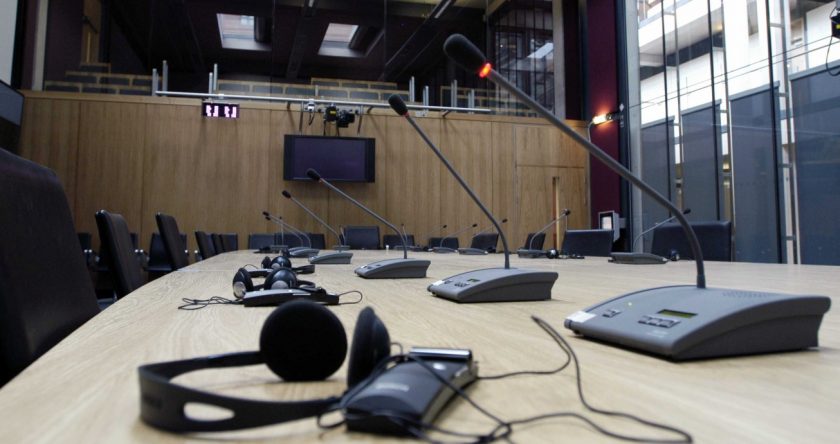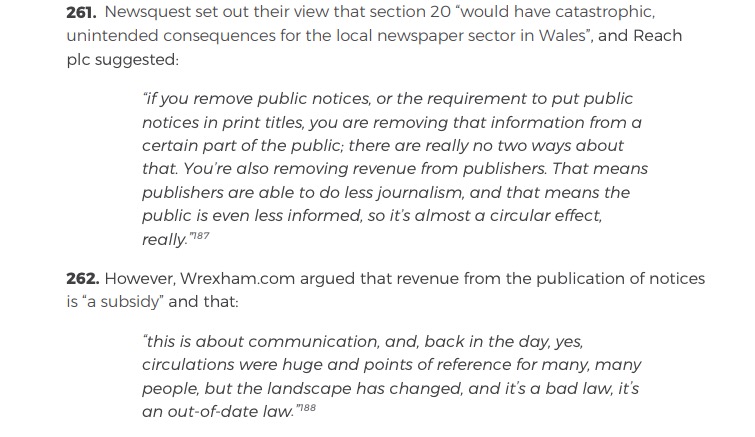“It is not for local authorities to fund local or national print media”, says Senedd committee

A Senedd committee appears to back the general principle that statutory notice law in Wales needs to change.
The sounding Local Government Finance (Wales) Bill Stage 1 Report has been published and contains the committee’s views and recommendations on a range of important items, including a move to a three year business rates ‘list’ with a ‘ambition for shorter cycles’ recognised alongside support for discretionary relief timing changes as well as tweaks to Council Tax (domestic rates) legislation.
As readers will be aware Wrexham.com and other independent media in Wales and across the UK have been pointing out the ludicrous situation where public entities are required by law to write formal notices in newspapers, usually buried at the back, and as recent evidence heard in the Senedd from a Carolyn Thomas MS, “…the print is so small that I can’t read it, even with my glasses on”.
Section 20 in the Bill replaces the requirements on local authorities to publish notices relating to council tax in local newspapers with a new duty to publish those notices online, and to put suitable alternative arrangements in place to ensure that such information is accessible to citizens who have difficulty accessing online facilities
The new report collates some of that evidence session, and the committees wider knowledge and discussions.
The report points to the explanatory memorandum from Welsh Government that details without a change to the law the council tax legal requirement could cost local authorities collectively £330,000 over a period of ten years and “…estimates that maintaining advertisements in regional newspapers would cost local authorities a further £55,000 over the same period. The EM also notes additional costs of up to £15,000 a year for local authorities from publishing notices on council tax premiums”.
Of course this is limited to the notices required by this specific law, not the huge range of existing laws for all elements of local, national, quango and other notices that mean newspapers benefit and thus large industry interest in a minor law change that could be replicated to others.
The Welsh Local Government Association are quoted, by the committee, “The WLGA noted that “printed media is in a different position in 2024 than it was in 1993”, but told us that that “local authorities [….] know how to reach their residents”, and emphasised that how to publish notices should be “a local authority decision”.185 They also noted that the information “is provided with the council tax bill itself”.
Newsquest Media Group Limited, which is a subsidiary of billion dollar operation Gannett Co. Inc in the USA, argued to keep the cash, whereas our response was it was in effect a subsidy:
Newsquest, Reach PLC and the Older People’s Commissioner for Wales supported retaining newspaper notices due to ‘increasing exclusion of older people’. The proposed change was criticised as being ‘vague’, and the OPCW also noted the the small print of current notices is problematic.
The committee digested a range of views and say, “While we acknowledge that section 20 would not prevent local authorities from continuing to publish council tax notices in newspapers, we are mindful that, given the current financial pressures, local authorities may choose not to do so in order to make savings.
“We therefore note the concerns about the potential loss of revenue for newspapers, while acknowledging that it is not for local authorities to fund local or national print media.
“Additionally, we recognise that people receive their information in different formats, therefore publishing notices in newspapers may no longer be the most effective way of providing information to taxpayers.
“We agree with the WLGA that each local authority is best placed to decide how to publish this information, depending on the needs of the communities they represent. We therefore understand the benefits of not being overly prescriptive with the provisions in the Bill.”
They add: “However, we are mindful that a significant proportion of the population may not have access to digital facilities, and it is vital that consideration is given to how they can be reached.
“Without easily accessible information, there is a risk that people may become disengaged. We believe that greater clarity is therefore needed about the alternative arrangements for providing information to those with limited or no access to online facilities.
“We recognise that, traditionally, local libraries would have been a suitable place for people to access information, however as demonstrated in our inquiry on local authority leisure and library services, many local facilities have closed.”
“We realise that all taxpayers will receive council tax information with their annual bill, however some may wish to be aware in advance of this in order to prepare. It will therefore be important for the Welsh Government to monitor how and where local authorities choose to publish council tax notices following implementation of the Bill, to ensure that the notices are reaching the widest audience possible.”
The committee were critical of the current use of notices, “Our evidence session touched briefly on the accessibility of notices published in newspapers. We understand that notices are required to contain specific information, however their current format is formal and often in small print.
“We would urge the Welsh Government to work with local authorities to consider how these notices can be more engaging and accessible to those reading them”.
Three recommendations emerged, the first being directly connected to the Section 20 change, “The Welsh Government should set out how it plans to monitor the implementation of the provisions in section 20 across local authorities and evaluate their impact on accessibility and transparency”.
With Reach and Newsquest arguing that the cash from such notices was required to support journalism, with the latter going as far as saying without them six out of ten Newsquest newspapers in Wales would have been loss making last year without public notice revenue, the committee made two recommendations around that theme.
In Wrexham.com’s evidence we recognised the precarious state of journalism in Wales, however pointed out that the debate was not really for the committee and wider questions and answers were needed.
(Wrexham.com evidence submission in person at committee: *)
I’ve got to be blunt with you on this one. This comes across as really desperate, and I’m really disappointed, to be honest, because I echo and endorse Reach and Newsquest in what they say about the threat to journalism in Wales and that the situation is pretty dire. And this is not due to local reporters, local operations or anything like that; these are trends globally in terms of how the tech giants do work. And that’s all true, but that’s a debate for outside this committee, and I do hope it is addressed properly and sensibly. But, if statutory notices are such a key element of revenues and such a lifeline to Welsh journalism—four sides of A4 and no examples, no case studies here of good engagement, no working with local authorities to say, ‘Put a different URL on a statutory notice and you can track how many people go through it’—there’s none of that. There is no evidence here. It is, ‘Well, people buy it and obviously they read it front to back’, which, when you’ve got huge circulations, the numbers game would point to that being a percentage and being true, but it’s just no longer the case.
I’m really disappointed, to be honest, because there is a genuinely serious issue about the future of journalism. This isn’t the answer to it, and this feels like when newspaper groups were blaming Ebay for taking classified advertising, Rightmove for having taken the revenues for advertising for housing, et cetera, et cetera. It’s another one: ‘We were big, we’re not anymore. There are alternatives.’ I’m genuinely a bit disappointed by the responses.
The committee appears to have taken the concerns from all media contributing evidence onboard, and in the second recommendation writes: “In recognition that some of our discussions touched upon issues beyond the scope of the Bill, in particular the funding of local newspapers and a potential broader move towards the use of digital notices, we wrote to the Senedd’s Culture, Communication, Welsh Language, Sport and International Relations Committee to draw their attention to these matters.”
The third and final recommendation around Section 20 is also linked to the state of journalism and possible improvements: “We note in particular the recommendations in a report by the Fifth Senedd’s Culture, Welsh Language and Communications Committee, which called on the Welsh Government to assess whether there are more cost effective ways of publicising statutory notices and how any savings released could be reinvested in supporting public interest news journalism.
“The Welsh Government should continue to reflect on this recommendation and consider how work in this area could inform the implementation of the provisions in section 20.”
Since the report was published the latest ABC figures are out, as we reported a local title dipped below 2000 copies for the Wrexham edition, and one title in Wales that carries statutory notices has a circulation of just 279.
Stage one a bill is very early days (as is helpfully explained here) where the ‘general principles’ are firmed up in the Senedd.
Odd Committee Article Edit
*The Senedd committee session we attended was covered by the ICNN Senedd Reporter, a grant funded role that Wrexham.com and others pushed for as we felt the Senedd needed an extra pair of eyes. The excellent reporter writes independently from us, and we and others get the feed at the same time.
The reporter’s article is here as it was syndicated to us, and was used the morning after verbatim by others , for example on the Newsquest Barry and District News site (and other Newsquest sites):
However Google’s cache that day, and elsewhere, recorded a bizarre edit after publication with sections changed and removed. This appears to have only taken place on Newsquest’s sites and was not made by the ICNN Senedd Reporter :
A line reporting Newsquest’s exact verbal evidence originally read:
Emphasising the importance of the revenue, he said six of Newsquest’s ten local newspapers in Wales would have been loss-making last year without public notices.
It was edited after publication to read:
Emphasising the importance of the revenue, he said some of Newsquest’s local newspapers in Wales would have been loss-making last year without public notices.
Three lines about Wrexham.com’s view citing ‘the declining reach of local newspapers and stressed that the legal requirement is an indirect subsidy propping up the industry’, ‘the requirement to publish public notices is no longer providing value for money’, and “Wrexham.com does not want to get on the gravy train: “We don’t want the money for statutory notices – it’s a terrible law, a terrible way of communicating.” He added that the website would be willing to carry such notices for free” were also removed.
It was replaced a new line, not written by the ICNN Senedd Reporter still bylined, “Rob Taylor, founder of Wrexham.com, argued that the legal requirement was an indirect subsidy propping up the industry. Digital only titles, such as Wrexham.com, do not get income from public notices due to the requirement for notices to be published in print. In Wrexham, the local newspaper is The Leader, owned by Newsquest.”
Readers may find the full unedited exchange from the committee session (below) enlightening:
Newsquest: I didn’t really want to get into an argument on this, but I am disappointed with Rob’s attitude on this. I think it’s just worth bearing in mind the context, that Wrexham.com, as a hyperlocal digital publisher, is not able to benefit from public notices at the moment. It doesn’t have a printed product. And I can’t help but feel that there’s a bit of feeling left out here. But, it is worth noting that this Bill would not put money into hyperlocal digital news providers either; it would just take it away from the industry. The Minister’s response to the News Media Association and others talks about councils putting the notices on their own websites, it talks about them putting notices in local libraries or in community centres, which would not be widely accessed. So, I’m not sure exactly where Rob’s coming from on this, but I think he’s bringing a bit of an axe to grind on this, and I don’t think it’s particularly helpful. He’s obviously welcome to his view, but removing public notices would take away support from local journalism full stop, not just printed newspapers.
Wrexham.com: Yes, I think it would be fair to come back on that one. It would be easy for us to sit here and say, ‘We’re strong, independent titles, and more relevant—can we get on the gravy train?‘ essentially. And this is why I put it in the submission. We’ve held this position consistently. Locally it’s verifiable as well, from about 2013 onwards, and in the Senedd itself, 2017. The same point is being made. This is not about us getting money. We don’t want the money for statutory notices. It’s a terrible law, it’s a terrible way of communicating, and I know media buyers and publishers would prefer the status quo on it. We rarely dip into politics and we rarely give our view on stuff, but this is something that is basically a bad old law. It’s as simple as that, and we see it. You don’t read about statutory notices in the media, because they benefit from them. Nobody else will tell you about this, and nobody else—. We’ve accidentally become experts in this because we’re looking at spending and we’re looking at public money, where it goes. Yes, it’s just calling it out, basically. There’s no axe to grind here. We don’t want the money and we’re quite happy to run statutory notices for free, if that helps.
The full session transcript , and video , is here.
Spotted something? Got a story? Email [email protected]














